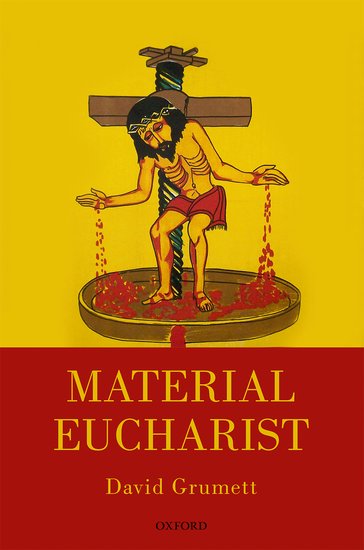
Material Eucharist
by David Grumett
Oxford University Press, 2016. ISBN 978-0-1987-6707-7 (hb). 336 pp.
Material Eucharist interprets the Eucharist through its material elements of bread and wine. Drawing upon a rich variety of biblical, patristic, medieval, and modern texts and traditions, David Grumett brings together theological reflection and liturgical action and shows their mutual dependence. For both theologians and liturgists, a central concern is the matter out of which the created order has been made, from which issues of community and social justice are inseparable. The ingredients of bread and wine anticipate, in their harvesting and manufacture, the formal church liturgy, which is extended back into the world by the transformative priestly action of laypeople. Indeed, the transforming presence of Christ in the Eucharist as flesh and substance is theologically grounded in his transformative presence in the wider created order, as expressed in eucharistic giving and exchange between churches and their wider communities. Rooting the Eucharist in materiality suggests its primary context to be the death and resurrection of Christ in the power of the Spirit, in which its recipients may share. The many aspects of theology and liturgy with which the book deals have large implications for how the Eucharist is understood in a range of academic disciplines, and for how it is celebrated in churches today.
'the breadth of sources is immensely impressive' James Arcadi, Modern Theology
'a tight and erudite presentation' Gabriel Daly OSA, One in Christ
'indispensable' Andrew Davison, The Times Literary Supplement
'wide ranging and lucidly argued' Edward Dowler, Church Times
'demonstrates remarkable command of primary source material' Sara E. Evans, Reading Religion
'challenges the worst inclinations of modernity to denigrate and desecrate both creation and humanity' James Farwell, Anglican Theological Review
'an important and compelling study' Paul Fiddes, Ecclesiology
'encyclopedic knowledge drawing widely from different epochs and cultural contexts' Christopher Irvine, Theology
'an antidote to secular materialism' Matthew Jarvis OP, New Blackfriars
'shows the significance of the Eucharist for Christian life in the world' Ruth A. Meyers, Anglican and Episcopal History
'a wide-ranging constructive theological investigation' Martha Moore-Keish, Scottish Journal of Theology
'an outstanding monograph' Karen O'Donnell, Reviews in Religion and Theology
'prompts the reader to reflect on contemporary practice' Alvyn Pettersen, Modern Believing
'a fantastic read for theologians, pastors, and seminarians' Andrew Thompson Scales, Homiletic
'genuinely thought-provoking' Mark Smith, Churchman
'a timely study' Bryan Spinks, The Expository Times
Chapter headings
Introduction
1 Elements: transformations of nature; grain; salt; olive oil; water; leaven; baking; grape and vine
2 Action: silence and representation; on Earth as in Heaven; life and sacrifice; communing; priesthood, matter, and transformation
3 Christ the Bond of creation: the Host as talisman; Christ the Preserver; Christ the Bond of Substance; the World as altar; the altar, the world, and God's body
4 Flesh, substance, and change: matter and transformation; assimilating flesh; the Council of Trent: tradition and innovation; the Eucharist and Aristotle; alternatives to transubstantiation; union in the Eucharist and in Christ
5 Death and resurrection: viaticum; eucharistic burial; the dead and the altar; raised by the Spirit; the Spirit in recent Eucharistic Prayers
6 Social bond: the Host and the hearth; the fermentum; piety and grace; participation and consummation; eulogia; bread, community, and Church
7 The Holy Spirit: the Holy Spirit, baptism, and Eucharist; spiritual ascent; ascending and descending; spirit and matter
Epilogue
Details on publisher's website